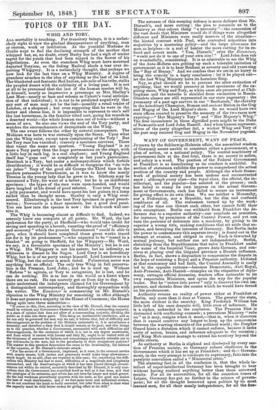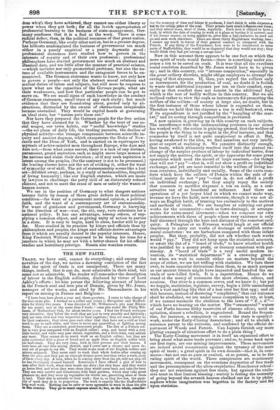WANT OF GOVERNMENT, WANT OF PEACE. JUDGED by the Schleswig-Holstein
affair, the assembled wisdom of Germany seems unable to construct either a government, or a plan of action, or a national policy. The central machinery of government fails at the first trial, there is no accord in action, and policy is a word. The position of the Federal Government at Frankfort is as humiliating as its conduct is unskilful. No section of statesmen exhibits the power to comprehend the actual position of the country and people. Although the whole frame- work of political society has been undone and reconstructed anew ; although every class—the royal class, the official, the in- tellectual, and the popular—has assisted at the process; each has failed to stamp its own impress on the actual Govern- ment or Governments, each has failed to secure an instrument for giving effect to its own ideas. We see neither a Monarchy, nor a Federation, nor a Republic, but the dim and confused semblance of all. The statesmen turned up by the work-
ing of the time can thwart each other, but cannot fulfil their own conceptions. Berlin can withhold from Frankfort the de- ference due to a superior authority—can conclude an armistice, for instance, by permission of the Central Power, and yet can turn the pretence of deference into a mockery, by giving to its superior a wrong title, making conditions that set aside that su- perior, and betraying the interests of Germany. But Berlin lacks the power to consummate this separate treaty ; is found out in the attempt at evasion, and obliged to stop. Each is thwarted by mutual jealousy, but neither can act independently. Berlin, shrinking from the Republicanism that rules in Frankfort under the name of the Imperial Vicar, grows Anti-German, and con- nives at placing over the litigated province a Danish influence. Berlin, in fact, shows a disposition to compromise the dispute in the hope of restoring a Royal and a Prussian authority. Irritated at that contumacy and bad faith, the Central Assembly is easily. led to the opposite extreme—becomes Democratic, Anti-Royal, Anti-Prussian, Anti-Danish—tramples on the etiquettes of diplo- macy, outrages official decencies, renders office untenable to its own respectable Ministers, and opens the way for the popular leader. But he "enters into power only to discover his own im- potence, and shrinks from the course which he would have forced on his predecessors. Authority retains no reality of power either at Frankfort or Berlin, any more than it does at Vienna. The greater the state, the more evident is the anarchy. King Frederick William has little left of his once despotic will, little even of influence. He is a cipher, unheeded in the confusion. The Prussian Diet is distracted with conflicting counsels ; a precarious Ministry "rubs on" as it may, resigns when it must,—that is, when it discovers that it cannot contrive any longer to keep up the compromise between the warring elements of the political world ; the Burgher Guard hints a dictation which it cannot enforce, because it lacks unity of action, brains, and influence adequate to the occasion ; and King Mob cannot manage to extend his territory beyond the public streets. As authority at Berlin is slighted and disobeyed by every sec- tion of Prussian society, so Germany refuses obedience to the Government which it has set up at Frankfort ; and that Govern- ment, in the very attempt to vindicate its supremacy, falls into the paralytic convulsion called a "Ministerial crisis." The alarming fact in all the confusion is, that the whole in- tellect of super-intellectual Germany has been brought to bear without having realized anything better than these untoward results. For all its universities, for all the countless tomes of Leipsic, Germany has got no further in the science of its for all the thought bestowed upon politics by most learned men, for all their manly independence, for all the free' dom which they have achieved, they cannot use either liberty or power when they get both; for all the lavish appropriation of professorial learning to the business of state-management, Ger- many confesses that it is a fool at the work. There is some radical defect, then, in the political resources of that great nation. Perhaps Germany, like every other nation, but in a greater degree, has hitherto contemplated the business of government too much either in a purely empirical or a purely dogmatic mood : professional statesmen have studied how to govern in the interests of royalty and of their own profession; professional philosophers have studied government too much on abstract and classical data, and too little after the manner of practical science, —which includes not only geometrical problems, but also the na- ture of available instruments and the antagonist forces to be en- countered. The German statesman wants to know, not only how to govern a people—not only the abstract moral relations and mutual duties of rulers and subjects, but still more he requires to know what are the capacities of the German people, what are their weaknesses, and how that particular people can be got to move on. We see small signs of such knowledge in the conduct of German statesmen, small trace of any such study ; but much evidence that they are floundering about, guided only by ab- stractions, distracted by the swarm of obstructions insuperable because unstudied. They would be capital hands at governing an ideal state, but "nature puts them out."
Nor have they prepared the German people for the free action that they have claimed for it. Whether by the bent of our so- cial usages, our town habits, our "useful knowledge" studies —the set plans of daily life, the trading pursuits, the decline of physical activity—the strange compromise between scientific in- quiry and ancient dogmas, which exasperates the Duke of New- castle and the Dean of York, and is carried on in equivoqnes by myriads of active-minded men throughout Europe, who dare and dare not,—from what cause soever, there is a lack of any distinct, paramount, grand aspiration such as might move large masses of the nations and claim their devotion; or if any such aspiration is latent among the peoples, (for the contrary is not to be presumed,) the leading classes have not the art of evoking it, either for want of sympathy or of skill. The art of statesmanship seems like a lost art—fribbled away, perhaps, in a study of technicalities, forgetful of living humanity ; like our English statutes, which are made by lawyers to challenge the petty skill of an elaborately refined rIticane, and not to meet the sense of men or satisfy the wants of human nature.
We see in the position of Germany to what dangers nations become liable by reason of those great defects in their political condition—the want of a paramount national opinion, a political faith, and the want of a contemporary art of statesmanship. For want of guidance and government, Germany is hurrying in the direction of war—war, the old, easy, rude substitute for a national policy. It has one advantage, among others, of sup- plying a common object, and so giving unity of action to parties in a state. It is easy to begin, hard to close, harder still to pay for. More studied in its practice by kings and officials than by philosophers and peoples, the kings and officials derive advantages it which are usually denied to the popular interests. Hence, King Frederick William is supposed to be biding his time for a juncture in which he may act with a better chance for his official studies and hereditary prestige. Russia also watches events.



























 Previous page
Previous page